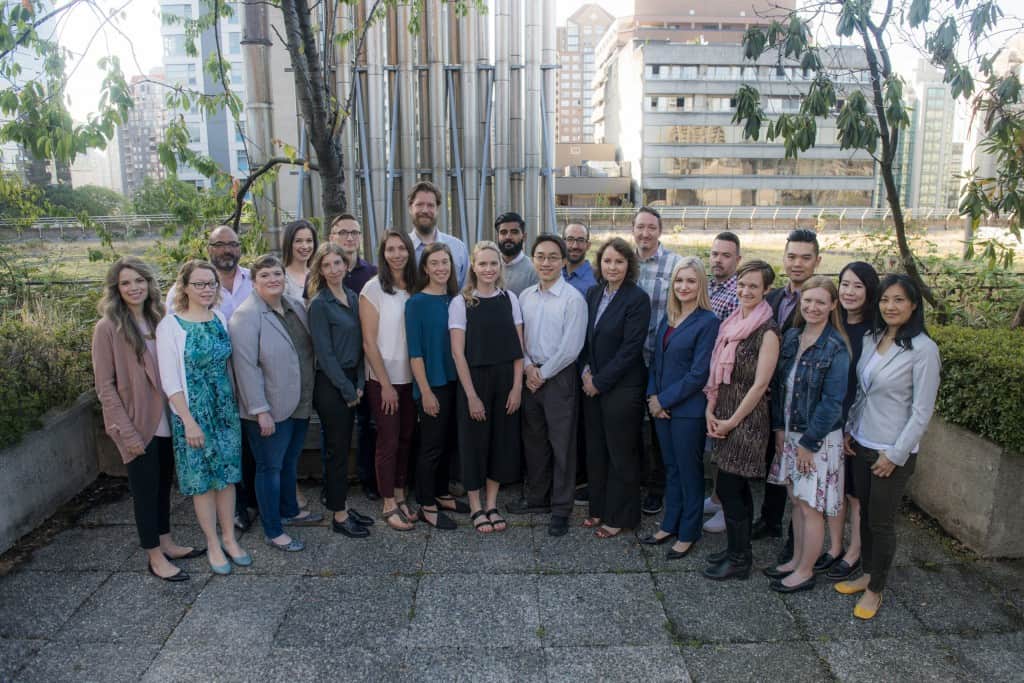The second in our series: Teaching, learning, training. All in day’s work.
In its early days, St. Paul’s grappled with a severe doctor shortage. So did the other 155+ hospitals in BC. How could we stand out from the crowd to attract the best and brightest medical students? The hospital came up with the radical idea of paying its interns. It worked. Before long, the wards were bustling with both top-notch students and well-trained doctors.
Today, one of the ways Providence Health Care (PHC) recruits exceptional students is by offering sought-after fellowships with some of the very best teachers in medicine. And, yes, we continue to pay them thanks in part to the generous support of our amazing donors!
Here’s a quick look at three of our most distinguished fellowships.
The gift of sight
Dr. William Ross is one of the best vitreo-retinal specialists in the world. For almost 50 years, he has saved and restored the sight of countless patients in the Ophthalmology Department at St. Paul’s Hospital. Yet, if you ask him what gives him the most satisfaction, he’ll say teaching.
“I never want to stop teaching,” he says. “Passing on my skills, my knowledge, and my judgment means everything.” In his long career, Dr. Ross has mentored more than 120 residents and 60 vitreo-retinal surgeons.
During their training, fellows participate in weekly clinics, teach, present during educational rounds, participate in clinical research projects, and are expected to publish at least one clinical paper during their training. On the surgical side, fellows perform some 1,300 surgeries in a year including more than 500 retinal detachment repairs. It’s an incredibly robust, well-rounded program. And it’s benefiting people around the world because Ross specifically asks his fellows to commit to working in their home countries for at least five years after their fellowship.
It is a particular point of pride for Ross that Dr. David Albiani, head of the Department of Ophthalmology at PHC, started his surgical career as one of Ross’s vitreo-retinal fellows. Today, that fellowship opportunity continues thanks to a remarkable 25-year gift from the Gwyn Morgan and Patricia Trottier Foundation.
Don’t be still, my beating heart!
Every hour, 12 Canadian adults die from heart disease.
Enter the Beedie Family Fellowship in Lipidology and Cardiovascular Disease Prevention. This innovative program focusses its training on lipid disorders, heart disease prevention, and risk reduction.
Fellows are offered a true multi-disciplinary experience that includes endocrinology, the diabetes clinic, and the heart failure clinic. In addition to the core program, fellows are encouraged to expand on their own areas of interest.
The first fellow, Dr. Pol Darras, participated in a major research project using big data to evaluate how well we’re doing at preventing heart disease and strokes.
The second, Dr. Apoorva Bollu, sought additional training in obesity management, blood pressure management, and smoking cessation.
The incoming fellow, Dr. Iulia Latan, will bring her experience back to the lipid community in Montreal giving our fellowship a pan-Canadian influence. It’s also worth noting that the calibre of our program is so strong, McGill University has offered her a faculty position upon completion of her training with us.
The science and compassion of addiction medicine
Almost a decade ago, with a gift of $3 million from Goldcorp, Inc., the Foundation launched a unique fellowship in addiction medicine at the BC Centre on Substance Use. It was the first program of its kind in Western Canada and remains the largest inter-disciplinary addiction medicine fellowship in North America.
At the time, there was little formal training in this area. Doctors graduated medical school knowing how to deliver babies (even though many of them would never do so), but not how to recognize and treat problematic substance use (even though the use of alcohol, tobacco, marijuana, opioids, and stimulants is widespread).
Today, the program has expanded to include fellowships for doctors, nurses, nurse practitioners, social workers, pharmacists, and researchers. Fellows are trained in detox, in-patient addiction care, residential treatment, complex pain, and the physical and mental health issues that can accompany substance use.
With the graduation of this year’s candidates, 112 fellows will have completed this specialized training. One of the first, Dr. Seonaid Nolan, now holds the inaugural Steven Diamond Professorship in Addiction Care Innovation at UBC. Nolan is not only treating patients and researching ways to improve outcomes for people with substance use disorder, she’s teaching the next generation.
When you give to St. Paul’s Foundation, you support innovative training programs that save and transform lives. In the words of Beedie fellow, Dr. Apoorva Ballu, “I am so grateful for the opportunity that this fellowship has provided and the mentorship that I have received. Thank you SO much!”
[To read the first part of this three-part series, click here.]
